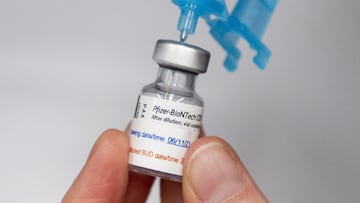Coronavirus US: Pfizer vs Moderna vaccine side effects
The two mRNA covid-19 vaccines have been linked to certain side effects, but how common are they and does it vary between the two manufacturers' shots?


The national push to get people vaccinated as quickly as possible is continuing, with many states offering various incentives and lucrative lotteries to encourage the unvaccinated to get a shot.
One reason some people have given for vaccine hesitancy is the possible side effects, but what are they and how common are they really?
The two most commonly administered covid-19 vaccines in the United States are the Pfizer-BioNTech and Moderna shots, both of which were developed using new mRNA technologies. As such, the most common side effects are found in recipients of both vaccines:
- Tiredness
- Headache
- Muscle pain
- Chills
- Fever
- Nausea
The Centers for Disease Control and Prevention also advise that there is can also be redness and some pain at the injection site, typically at the top of the recipient’s arm. These side effects are rarely serious, but the CDC to recommend that people remain at the vaccinated for 15 minutes after getting their shot, or 30 minutes for those with a history of allergies.
Read more
- Vaccine regulators investigate heart inflammation link
- Families look for guidance on how to travel safely with their unvaccinated children
- Experts warn that vaccines are less effective against the Delta variant
- Timeline for the whole US population vaccinated against covid-19
How common are these side effects?
While the common side effects are very similar with the two mRNA vaccines, they do vary in their frequency. Clinical trials for the Moderna vaccine found that the most common were fatigue (9.7%) and experiencing a headache (4.5%). In contrast, Pfizer report that just 3.8% of clinical trial participants felt fatigued after getting the shot, and 2% suffered a headache.
These fairly mild side effects are typically short-lasting and the CDC say that there is no reason to skip your second dose if you get a side effect from the first. A statement from the CDC calls them “normal signs that your body is building protection and should go away within a few days.”
Vaccine facts:
— Faheem Younus, MD (@FaheemYounus) June 14, 2021
Prevent >90% severe disease/death
Ok for Pregnant + lactating moms
Ok for ppl with ANY disease or ANY allergy
Don’t get antibody tested
Longterm side effects 1 in million, clots 4 in million
If active COVID, take >4 wks later
Mass vaccine = end the pandemic
"The Pfizer-BioNTech COVID-19 Vaccine and Moderna COVID-19 Vaccine both need two shots in order to get the most protection," the advice reads. "You should get the second shot even if you have side effects after the first shot, unless a vaccination provider or your doctor tells you not to get it."
Rare cases of heart inflammation found in younger vaccine recipients
In recent weeks the CDC has confirmed that there have been higher than usual cases of myocarditis, a rare heart inflammation, amongst certain groups after receiving a mRNA vaccine. In the most severe cases, the condition can affect the heart’s ability to pump blood around the body and can led to blood clots.
Related stories
The US Vaccine Adverse Event Reporting System (VAERS) tracks reported side effects with all vaccinations and found that there has been a notable increase in the number of people aged between 12 and 24 reporting myocarditis. That group accounts for roughly half of all instances of myocarditis after receiving a vaccine, but just 9% of doses administered so far.
At the stage the CDC has not yet confirmed whether or not the increase of cases is related to the vaccine but the investigation is ongoing. However it should be said that instances of myocarditis is still incredibly rare, even in vaccinated people; there have been just 226 cases in 141 million fully vaccinated Americans.

